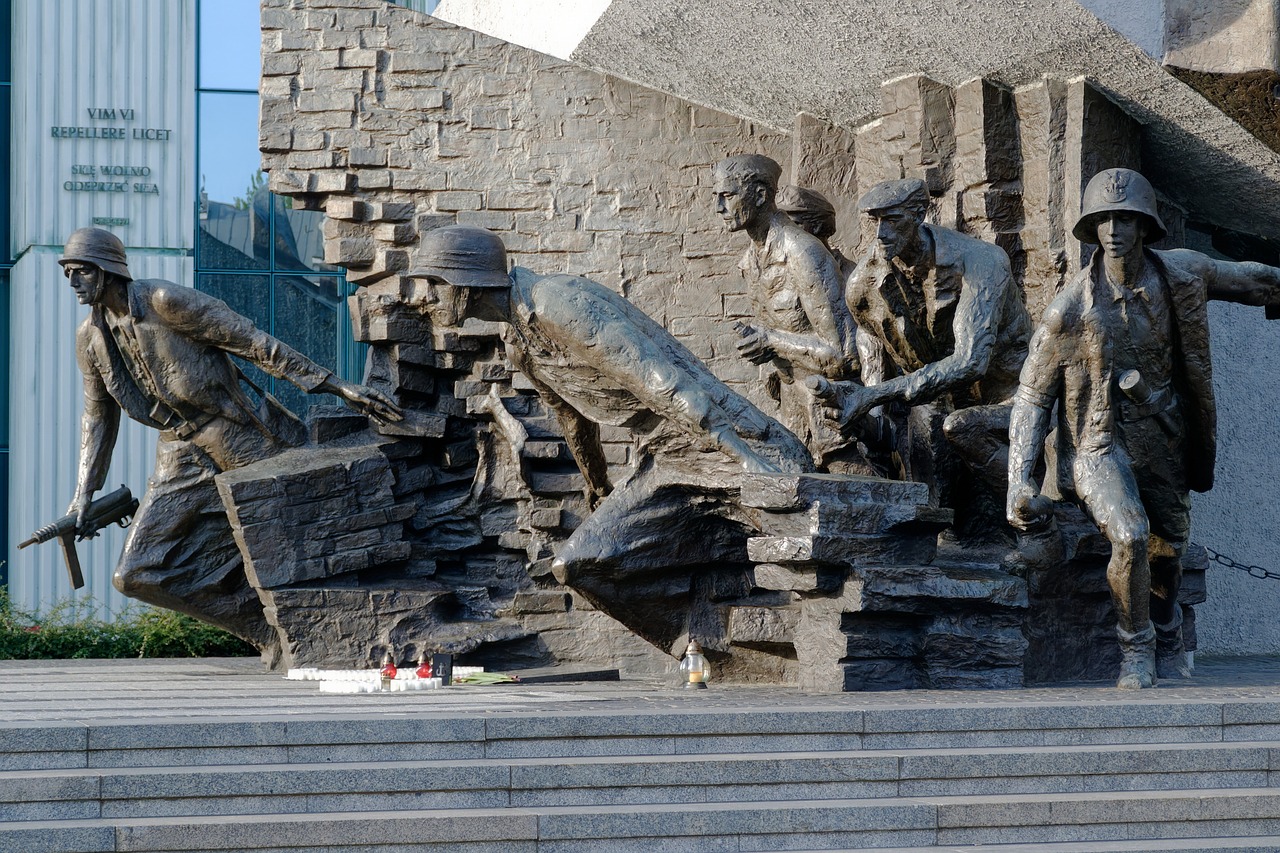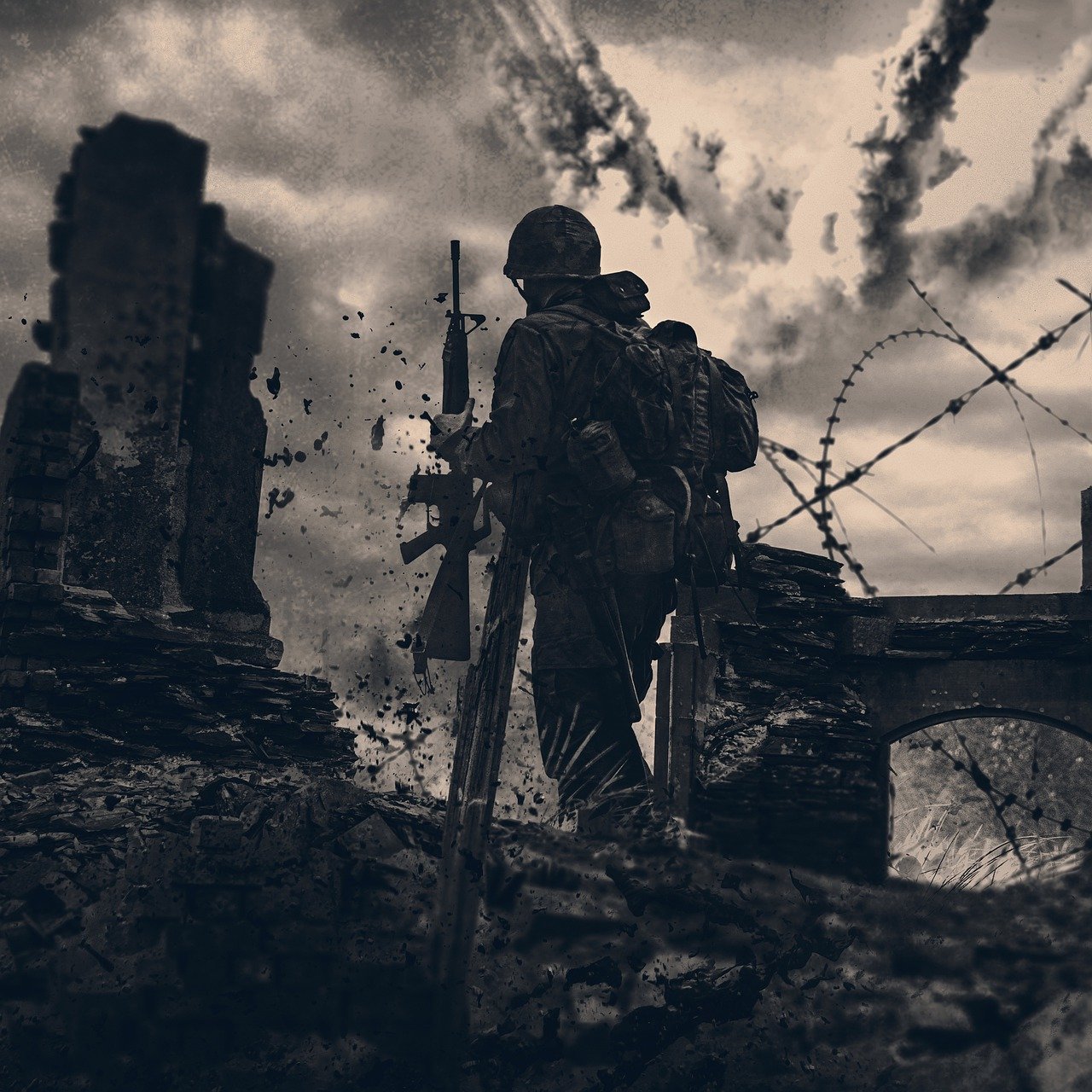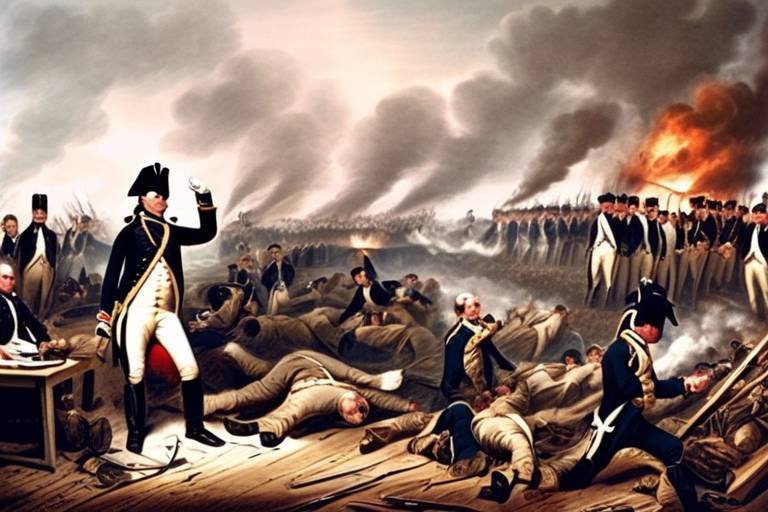The Causes of the War of 1812
The War of 1812, often referred to as America's "Second War of Independence," was a significant conflict that shaped the young nation's identity and relations with other world powers. Several key factors contributed to the outbreak of this war, each playing a crucial role in escalating tensions between the United States and Great Britain.
One of the primary causes of the War of 1812 was the British practice of impressing American sailors into their navy. This flagrant violation of American sovereignty and the forced conscription of American citizens into British service sparked outrage among the American people and government. The continued impressment of American sailors served as a major catalyst for the declaration of war.
Additionally, Native American alliances with the British further fueled the conflict. Native tribes, supported by the British, resisted American expansion into their territories, leading to clashes and hostilities along the frontier. These alliances not only complicated relations between the United States and Britain but also exacerbated existing territorial disputes.
The imposition of trade restrictions and blockades by both the British and French also played a significant role in the lead-up to the war. British blockades hindered American trade, while trade restrictions imposed by both European powers impeded American commerce. These economic grievances, coupled with the failure of diplomatic efforts to resolve trade disputes, pushed the United States closer to war.
Manifest Destiny, the belief in the inevitable westward expansion of the United States, clashed with British support for Native American tribes. This clash of interests over territorial expansion heightened tensions between the two nations and contributed to the overall causes of the war.
Furthermore, violations of American sovereignty, such as the infamous Chesapeake-Leopard Affair, where a British warship attacked an American vessel, further stoked anti-British sentiments in the United States. These incidents of British aggression and disrespect for American sovereignty fueled the growing calls for war.
The rise of War Hawks in Congress, fueled by nationalist fervor and a desire for territorial expansion, also played a crucial role in pushing the United States towards war. These politicians advocated for military action against Britain to assert American independence and secure the nation's interests.
Moreover, the impacts of the Napoleonic Wars in Europe influenced British actions towards the United States. The ongoing conflict in Europe shaped British policies towards America and influenced American perceptions of British aggression, setting the stage for the War of 1812.
Ultimately, the War of 1812 came to a resolution with the signing of the Treaty of Ghent. While this treaty restored pre-war borders and ended hostilities, many underlying issues remained unresolved, leaving lingering tensions between the United States and Great Britain.

British Impressment of American Sailors
During the early 19th century, one of the key factors that fueled the tensions leading to the War of 1812 was the British practice of impressing American sailors into the Royal Navy. This controversial practice involved British naval officers forcibly recruiting American sailors into their service, often on the pretext of them being British subjects who had deserted. The impressment of American sailors not only violated American sovereignty but also infringed upon the rights of American citizens.
This practice of impressment was a major point of contention for the United States, as it directly impacted its maritime trade and the livelihoods of its seafarers. American ships were boarded by British naval vessels, and sailors who were believed to be British deserters were captured and pressed into service, regardless of their actual nationality. This blatant disregard for American citizenship and the forced conscription of American sailors created widespread outrage and resentment among the American populace.
The British impressment of American sailors not only strained diplomatic relations between the two nations but also served as a significant catalyst for the declaration of war by the United States. The American government viewed the practice as a violation of its sovereignty and an affront to the rights of its citizens. The British refusal to cease impressment despite American protests further escalated tensions and ultimately contributed to the outbreak of hostilities between the two countries.
Additionally, the British practice of impressment exacerbated anti-British sentiments within the United States and galvanized support for the war effort. The perceived aggression and disrespect shown towards American sailors fueled a sense of national pride and unity, prompting calls for retaliation and the defense of American sovereignty. The issue of impressment, coupled with other grievances, solidified the resolve of the American government and public opinion in favor of war against Britain.

Native American Alliances
During the War of 1812, Native American tribes played a significant role in shaping the conflict between the United States and Britain. These tribes formed alliances with the British, seeking to resist American expansion into their territories. The British, in turn, provided support to these Native American groups, viewing them as valuable allies in their own struggle against the Americans.
These alliances added a complex layer to the already tense relations between the United States and Britain. The Native American tribes, with their knowledge of the land and guerrilla warfare tactics, posed a formidable challenge to American forces. Their resistance to American expansion further fueled the animosity between the two nations.
Moreover, the Native American alliances highlighted the clash between American manifest destiny and British interests. While Americans saw westward expansion as their right and destiny, the British supported Native American tribes in their efforts to maintain their lands and autonomy. This conflicting vision of territorial control intensified the territorial disputes that were a key aspect of the War of 1812.
As a result, the Native American alliances not only complicated the military dynamics of the war but also deepened the cultural and ideological divides between the United States and Britain. The involvement of Native American tribes added a layer of complexity to the conflict, highlighting the broader implications of the war beyond just the two major powers involved.

Trade Restrictions and Blockades
During the early 19th century, trade restrictions and blockades imposed by both Britain and France had a significant impact on American commerce. The British, in particular, implemented policies that hindered American trade, leading to economic grievances and ultimately contributing to the outbreak of the War of 1812. The Orders in Council issued by Britain restricted American ships from trading with France and its allies, severely limiting American merchants' ability to conduct business freely.
Furthermore, British naval blockades further impeded American trade by capturing and confiscating American vessels attempting to evade these blockades. This aggressive interference with American shipping not only disrupted commerce but also infringed upon American sovereignty, provoking outrage among the American people.
As a result, American merchants faced significant challenges in maintaining their trade routes and sustaining their businesses. The economic impact of these trade restrictions and blockades was deeply felt across the young nation, fueling calls for retaliation and a push towards war with Britain.
In response to these oppressive measures, the United States sought to assert its independence and protect its economic interests by declaring war on Britain in 1812. The trade restrictions and blockades served as a catalyst for the conflict, highlighting the tensions between the two nations and underscoring the importance of economic freedom in shaping foreign policy decisions.
The War of 1812, sparked in part by these trade-related grievances, would ultimately test the resolve and resilience of the young American nation as it faced off against one of the world's superpowers in a bid to secure its economic future and assert its place on the global stage.

Manifest Destiny and Territorial Expansion
Manifest Destiny was a powerful force driving American expansion in the early 19th century. It was the belief that the United States was destined to stretch from coast to coast, spreading democracy and civilization along the way. This concept fueled the desire for territorial expansion, pushing Americans to move westward in search of new lands and opportunities. However, this vision clashed with British interests, particularly their support for Native American tribes who stood in the way of American expansion.
As Americans moved further west, conflicts over land ownership and control intensified. The British, seeking to maintain their influence in North America, formed alliances with Native American tribes to resist American encroachment. This support for indigenous peoples further fueled the territorial disputes between the United States and Britain, setting the stage for confrontation.
The idea of Manifest Destiny also played a significant role in justifying American actions during the War of 1812. Advocates of Manifest Destiny believed that it was their right and duty to expand across the continent, regardless of the obstacles in their path. This sense of destiny, combined with the perceived threat of British interference, galvanized American resolve to assert their territorial ambitions and protect their expanding nation.
Ultimately, Manifest Destiny and the push for territorial expansion were key factors in the lead-up to the War of 1812. The clash between American aspirations for westward growth and British support for Native American tribes created a volatile mix that contributed to the outbreak of hostilities between the two nations.

Violations of American Sovereignty
Violations of American Sovereignty played a significant role in escalating tensions between the United States and Britain, ultimately leading to the outbreak of the War of 1812. One of the key incidents that fueled anti-British sentiments was the Chesapeake-Leopard Affair, where the British warship HMS Leopard attacked and boarded the American frigate USS Chesapeake off the coast of Virginia in 1807. This blatant violation of American sovereignty, which resulted in the impressment of American sailors into the British Navy, outraged the American public and government.
The incident highlighted the British disregard for American neutrality and territorial integrity, further straining diplomatic relations between the two nations. The practice of impressment, where British naval officers forcibly recruited American sailors into their service, was a direct affront to American sovereignty and sparked widespread condemnation. The British actions not only violated international law but also undermined American independence and sovereignty.
The Chesapeake-Leopard Affair symbolized the broader issue of British interference in American affairs and their lack of respect for American sovereignty. It served as a rallying cry for those advocating for war against Britain, as it showcased the need to defend American rights and sovereignty against foreign aggression. The incident contributed to the growing anti-British sentiment in the United States and fueled the push towards armed conflict.

War Hawks and Nationalism
During the early 19th century, a group of fervent individuals emerged in the United States Congress, known as the War Hawks, who played a pivotal role in shaping the events leading to the War of 1812. These War Hawks were driven by a potent mix of nationalism, expansionist ideals, and a fervent desire to assert American independence on the global stage. Their impassioned calls for war against Britain were fueled by a deep-seated belief in American exceptionalism and a vision of territorial expansion that extended beyond the established borders.
Imagine a group of determined hawks soaring high above, fiercely protective of their nest and eager to expand their territory. Similarly, the War Hawks in Congress were unwavering in their pursuit of aggressive policies towards Britain, viewing the conflict as a means to solidify American sovereignty and secure the nation's future as a dominant power in the Western Hemisphere.
These War Hawks championed a robust military response to British provocations, advocating for decisive action to safeguard American interests and challenge British dominance on the seas. Their fiery speeches and impassioned rhetoric resonated with a growing sense of national pride and unity, rallying support for war among the American populace.
As the War Hawks clamored for military confrontation, their fervor was fueled by a potent blend of nationalism and expansionist fervor. They saw the conflict with Britain as an opportunity to assert American identity, expand the nation's borders, and demonstrate the strength and resilience of the young republic.
In the halls of Congress, the War Hawks stood as staunch advocates for war, pushing for decisive action to defend American honor and secure the nation's place among the world powers. Their unwavering commitment to nationalist ideals and territorial expansion played a significant role in shaping the course of the War of 1812 and the future trajectory of the United States.

Economic Interests and Embargo Acts
During the early 19th century, economic interests played a significant role in escalating tensions between the United States and Britain, ultimately leading to the War of 1812. British interference with American trade, particularly through the practice of impressment, where British naval forces captured American sailors and forced them into service, severely impacted American commerce. This violation of American sovereignty and disruption of trade routes created economic grievances among the American population.
Furthermore, the failure of the Embargo Acts, which were implemented by the U.S. government to restrict trade with Britain and France in an attempt to protect American interests, only served to exacerbate the situation. The Acts not only proved ineffective in achieving their intended goals but also hurt the American economy by limiting international trade opportunities.
The economic interests of both nations clashed as Britain's naval blockades further hindered American trade, leading to widespread frustration and calls for action. The economic repercussions of these trade restrictions and blockades fueled anti-British sentiments within the American population and contributed to the growing push towards war.

Impacts of the Napoleonic Wars
The Napoleonic Wars, which ravaged Europe for over a decade, had profound impacts on the United States and its relationship with Britain. The conflict between Napoleon's France and the allied forces, including Britain, influenced British actions towards the United States in several ways. The British, preoccupied with the struggle against Napoleon, often resorted to aggressive tactics towards American ships and sailors, viewing them as potential threats or resources to be seized. This heightened sense of suspicion and hostility towards American interests can be traced back to the broader context of the Napoleonic Wars.
Moreover, the Napoleonic Wars fueled American perceptions of British aggression and interference with neutral commerce. As Britain sought to maintain its naval dominance and disrupt French trade, American vessels became caught in the crossfire. British blockades, impressment of American sailors, and trade restrictions imposed by both Britain and France severely impacted American commerce and maritime activities. The economic hardships faced by American merchants and traders as a result of these measures further exacerbated tensions between the United States and Britain.
Additionally, the Napoleonic Wars indirectly contributed to the political climate in the United States, particularly in shaping attitudes towards Britain. The anti-British sentiment that emerged during this period was influenced by British actions during the Napoleonic Wars, as well as American efforts to assert their independence and sovereignty in the face of foreign interference. The conflicts and power struggles in Europe had ripple effects across the Atlantic, impacting diplomatic relations and trade policies between the United States and Britain.

Resolution and Treaty of Ghent
The War of 1812 came to a conclusion with the signing of the Treaty of Ghent, marking the resolution of the conflict between the United States and Britain. This treaty, signed on December 24, 1814, in Ghent, Belgium, aimed to restore pre-war borders and bring an end to the hostilities that had characterized the war. However, the Treaty of Ghent did not address many of the underlying issues that had led to the conflict in the first place, leaving unresolved tensions between the two nations.
While the treaty succeeded in halting the fighting and returning territories to their pre-war status, it did not provide any substantial gains for either side. The lack of clear victories or concessions in the treaty meant that both the United States and Britain essentially returned to the status quo ante bellum, or the state existing before the war. This lack of decisive outcomes left some Americans feeling dissatisfied with the terms of the treaty.
Despite its shortcomings, the Treaty of Ghent did have some positive outcomes. It established a framework for future negotiations between the United States and Britain, laying the groundwork for improved relations in the years to come. The treaty also set a precedent for resolving conflicts through diplomacy rather than prolonged military engagement, demonstrating the potential for peaceful resolution of disputes between nations.
Overall, the Treaty of Ghent can be seen as a diplomatic end to the War of 1812, bringing an official conclusion to the conflict while leaving room for continued dialogue and negotiation between the United States and Britain. While it may not have addressed all the grievances that led to the war, the treaty represented a step towards reconciliation and the avoidance of further hostilities between the two nations.
Frequently Asked Questions
- What were the main causes of the War of 1812?
The main causes of the War of 1812 included British impressment of American sailors, Native American alliances with the British, trade restrictions and blockades, manifest destiny and territorial expansion, violations of American sovereignty, the influence of the Napoleonic Wars, and economic interests.
- How did British impressment of American sailors contribute to the war?
British impressment of American sailors angered the American public and government, leading to increased tensions and a sense of violation of American sovereignty, ultimately playing a significant role in the decision to declare war against Britain.
- What was the significance of the Treaty of Ghent?
The Treaty of Ghent ended the War of 1812 and restored pre-war borders between the United States and Britain. However, it failed to address many underlying issues that caused the conflict, leaving unresolved tensions between the two nations.
- How did the War Hawks influence the decision for war?
The War Hawks in Congress, driven by nationalist fervor and a desire for territorial expansion, advocated for war against Britain to assert American independence and protect American interests, contributing to the push for war.
- What role did economic interests play in the outbreak of the war?
Economic interests were a significant factor in the War of 1812, as British interference with American trade and the failure of the Embargo Acts to protect American commerce exacerbated tensions and contributed to the decision to go to war.



















